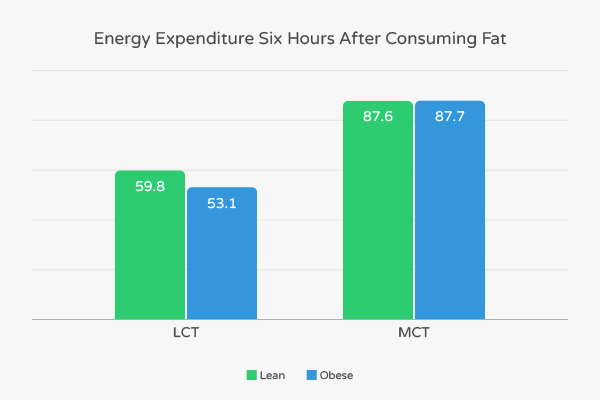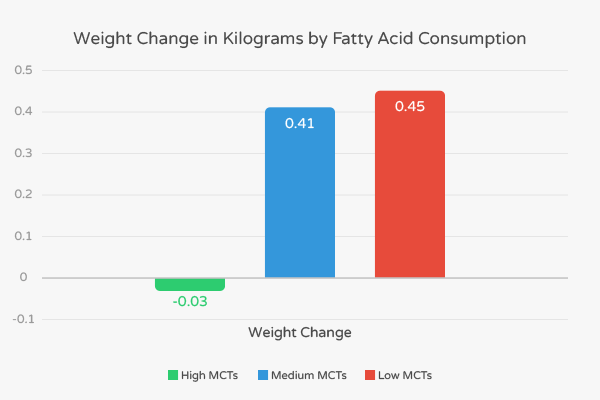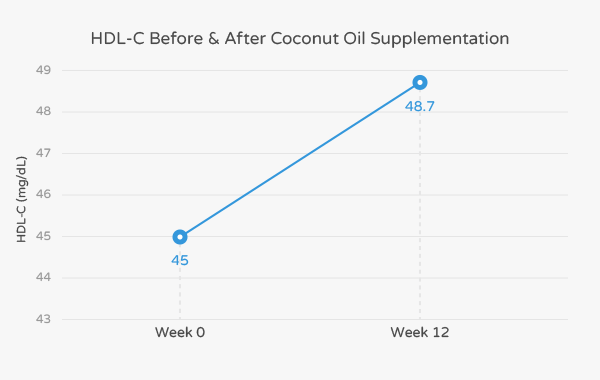Coconut oil is a common ingredient in keto recipes, paleo plates, and health-conscious kitchens, but is it really worth using?
Whether you’re a keto dieter or a vegan enthusiast, you’ve probably heard about energizing and ketosis-boosting benefits of coconut oil. Many even call it a “superfood.” But, is there any truth behind these claims?
In contrast, you may have also come across articles suggesting that coconut oil is bad for heart health. Is it possible that this keto-friendly ingredient comes with downsides?
In this article, we’ll investigate the current scientific literature to show you exactly how coconut oil may affect your body and whether or not you should add it to your ketogenic diet.
Here is a general overview of the topics we’ll discuss:
- What is coconut oil?
- Is coconut oil bad? Saturated fat myth-busting
- Coconut oil’s benefits
- How to use coconut oil on keto: recipe ideas and tips
- What is the best coconut oil for keto?
- What about MCT oil?
- FAQs about coconut oil
- Key takeaways
What is Coconut Oil? From Coconut Meat to Microscope

Coconut oil, also known as “copra oil,” is derived from the coconut meat of mature coconuts. Many ancient cultures have extracted the fats from coconut meat for use in cooking and as a way to improve skin, hair, and immune health.
When we look at coconut oil through a microscope, we find that it is entirely composed of molecules called triglycerides. These molecules consist of a 3-carbon molecule called glycerol attached to three chains comprised of carbon and hydrogen atoms called fatty acids. They typically come in one of three varieties: Monounsaturated, polyunsaturated, and saturated.
Approximately 91% of the calories in coconut oil are from saturated fats, which is sometimes called the “bad fat.” [1] Monounsaturated and polyunsaturated fats, which respectively compose 6% and 3% of coconut oil triglycerides, are typically referred to as the “good” or “healthy” fat.[1]
Because coconut oil is primarily composed of saturated fats, many people have demonized them while praising oils high in unsaturated fats (such as vegetable oil and olive oil) as being universally healthy.
When we take a look at the recent literature, however, it is misleading to refer to all saturated fats as being bad and all unsaturated fats as being good.
Is Coconut Oil Bad for You? Busting the Big Bad Fat Myth
The assumption that all saturated fats are bad for your health has recently come under scrutiny. In 2014, researchers conducted a meta-analysis of 72 research studies, including 27 randomized controlled clinical trials, examining the impact of saturated fats on cardiovascular health. Altogether, the studies included over half a million subjects.
After assessing the data, researchers found no significant association between the consumption of saturated fats and diseases of the heart and blood vessels. This included coronary heart disease, angina, and heart attack.
Thus, they concluded that “current evidence does not clearly support cardiovascular guidelines that encourage high consumption of polyunsaturated fatty acids and low consumption of total saturated fats.” [2]
Another meta-analysis of 21 observational studies that included almost 350,000 subjects also observed little association between cardiovascular diseases and the consumption of saturated fats. The authors concluded that “there is no significant evidence for concluding that dietary saturated fat is associated with an increased risk of CHD or CVD.” [3]
Even Harvard Medical School, which has traditionally taken a conservative stance on nutrition research, has stated that the relationship between saturated fat and heart disease is “muddled” and unclear.
Furthermore, saturated fats can vary chemically and nutritionally. In butter, red meats, other mammal-based animal products, and saturated fats are primarily long-chain triglycerides (LCTs) which are usually 13-21 carbon atoms in length.
In contrast, about 70% of the triglycerides in coconut oil are medium chain triglycerides (MCTs) which are usually 6-12 carbon atoms in length. [4] The most common MCT found in coconut oil is lauric acid, which is 12 carbons in length and makes up about 52% of the triglycerides found in coconut fat.
Because of their shorter length, MCTs have different nutritional and biochemical properties than LCTs. They contain about 10% fewer calories and go straight from your small intestine to your liver, where they can be turned into ketones for energy. In contrast, LCTs contain slightly more calories than MCTs, take longer to digest, and are not directly converted into ketones.
Because of the uniquely high amount of MCTs in coconut oil, scientists have been curious to learn how it impacts our health. Below, we’ll take a closer look at the research on coconut oil and how it may affect your weight, fat loss results, energy levels, and overall health.
A Quick Overview of Coconut Oil’s Benefits
Coconut oil comes with several potential benefits for body composition, heart health, and overall well-being:
- Increased resting energy expenditure.
- Hunger reduction.
- May help optimize cholesterol levels.
- May help burn extra belly fat when substituted for LCTs.
- Increased ketone levels.
You’ll find a deeper dive into the research for each coconut oil benefit below.
Can Coconut Oil Boost How Many Calories You Burn at Rest?
According to biochemistry, MCTs are more easily yield energy more readily than LCTs. However, what does this mean for your body? In a study from 1991, scientists sought to compare how many calories are burned after consuming a meal of LCTs and one of MCTs.
To test this, they recruited twelve subjects: six obese but otherwise healthy men and six lean, healthy men. They provided all subjects with a mixed meal including 38 grams of LCTs and then a mixed meal including 30 grams of MCTs plus 8 grams of LCTs the following day.
The dose of 30 g of MCTs and 8 g of LCTs was designed to imitate the ratio of saturated fats in coconut oil. The two meals were identical in calories and proportion of calories from fats, carbohydrates, and proteins. About six hours after each meal, the researchers measured the subjects’ postprandial thermogenesis (PPT), which is the energy used to carry out digestion.
In lean subjects, the researchers noted that subjects consumed about 59 calories due to postprandial thermogenesis after the LCT meal. [6] In contrast, they consumed 87.6 calories due to postprandial thermogenesis after the MCT meal. [6] This is a 41% greater expenditure of energy 6 hours after the MCT meal compared to the LCT meal. [6]
In the obese subjects, this increase was even greater: they experienced a 67% increase in energy expenditure after consuming the MCT diet. [6] Because of this observation, the authors stated that energy consumption is “…enhanced in both lean and obese subjects when LCTs in a mixed meal are replaced with MCTs.” [6]

Other studies have shown similar findings. In one clinical trial on seven healthy men with an average age of 21, researchers provided subjects with 400 calories of MCT or LCT and monitored their postprandial oxygen consumption- a key indicator of energy expenditure- for six hours.
They noted that postprandial oxygen consumption was 12% higher than normal after the MCT meal but only 4% higher than normal after the LCT meal. [7] The researchers concluded that “these data raise the possibility that long-term substitution of MCT for LCT would produce weight loss if energy intake remained constant.” [7]
In another study from Geneva Switzerland, researchers provided eight young men with three meals in a 24 hour period consisting of a ratio of MCTs to LCTs. During the 24 hour period, the first group of two consumed 0 grams of MCTs and 30 grams of LCTs, the second group of two consumed 5 grams of MCTs and 25 grams of LCTs, the third group of two consumed 15 grams of MCTs and 15 grams of LCTs, and the fourth group consumed 30 grams of MCTs and 0 grams of LCTs.
On average, the two groups that consumed 15-30 grams of MCTs burned an extra 120 calories- about 5% more than the groups that consume 0 or 5 grams of MCTs. [8] As a result, the researchers stated that their “…study suggests that relatively low-to-moderate intake of MCT (15-30 g per day) as part of habitual diet may play a role in the control of human body composition by enhancing daily [energy expenditure].” [8]
Key Takeaways: In both obese and lean male subjects, consuming MCTs found in coconut oil significantly increases basal expenditure as measured by postprandial thermogenesis and postprandial oxygen consumption.
It is important to emphasize, though, that these studies had small sample sizes and provided subjects with MCTs (which are abundant in coconut oil) but not actual coconut oil.
Does Coconut Oil Dispel Hunger?
In addition to stimulating greater energy expenditure, the MCTs found in coconut oil can help reduce appetite- another notable benefit for people trying to lose weight. In a 14-day study, researchers provided six healthy male volunteers with an average age of 27 years with one of three diets: one with a low ratio of MCTs to LCTs, one with a medium ratio of MCTs to LCTs, and one with a high ratio of MCTs to LCTs.
According to the authors, “the ratio of MCT to LCT was 1:2, 1:1 and 2:1 on the low-, (LMCT) medium- (MMCT) and high-MCT (HMCT) diets, respectively.” [9] All of the subjects consumed a fixed ratio of 62% calories from fats, 28% calories from carbohydrates and 10% calories from protein. However, they were free to consume whatever amount of food they wanted to.
After the trial was done, researchers noted that caloric consumption was significantly lower in the high MCT group. More specifically, the group that consumed a high ratio of MCTs to LCTs consumed 8% fewer calories than the group that consumed a low ratio of MCTs to LCTs. [9] Additionally, the group that consumed a high amount of MCTs was the only group that experienced any weight loss during the 14 days.
In fact, the other two groups experienced a moderate weight-gain. Below the data is displayed. The researchers concluded that swapping in MCTs for other saturated fats in a high-fat diet “can limit the excess energy intakes and weight gain produced by high-fat, energy-dense diets.” [9]

Another study on 12 healthy male subjects showed that subjects consuming a breakfast high in MCTs abstained from eating lunch for a longer period than subjects that ate a breakfast high in LCTs. [10] A scientific evaluation of the literature on coconut oil stated that while “fewer studies have examined the effects of MCT on satiety…these also suggest decreased food intake when LCT are replaced with MCT in the diet.” [11]
Thus, there is a reasonable amount of evidence to suggest that MCTs can help suppress hunger- at least when used instead of LCTs.
Key Takeaways: Swapping out fats high in LCTs, such as safflower and soybean oil, for fats high in MCTs such as coconut oil may suppress hunger and ultimately lead to greater weight-loss.
However, virgin coconut oil and other foods high in MCTs need to be assessed more rigorously against other weight-loss tools, such as eating greater dietary fiber, to better understand its effectiveness.
Can Coconut Oil Improve your Cholesterol Profile?
Cholesterol in the body most commonly comes in two different forms: LDL cholesterol (LDL-C) and HDL cholesterol (HDL-C). It is well-accepted among health professionals and researchers that increased levels of HDL-C are strongly associated with a lower risk of cardiovascular illness. [12]
Generally, researchers agree that elevated levels of LDL-C is roughly associated with an increased risk of cardiovascular disease- though LDL particle count and LDL particle size may be stronger indicators as well. [13, 14]
So, how does consuming coconut oil affect HDL-C and LDL-C? In a double-blind, randomized clinical trial with 40 women ages 20-40, researchers divided the subjects into two groups and provided them with 30 mL daily doses of supplements for 12 weeks.
The first group of 20 consumed a daily dose of 30 mL of soybean oil while the second group of 20 consumed 30 mL of a coconut oil supplement per day. All 40 women were asked to eat a balanced, low-calorie diet and walk for about 50 minutes each day.
Researchers collected one week prior to the 12-week dietary intervention and one week after it was finished. At the first data collection, researchers noted no differences in cholesterol levels, BMI, or waist circumference. At the second data collection, they noted that women who consumed the coconut oil supplements had increased levels of HDL-C from 45.0 mg/dL to 48.70 mg/dL. [15] This represents an 8.2% increase. [15]
In contrast, the women who ate the soybean oil supplement had no changes in HDL-C. Additionally, while BMI was reduced in both groups, only the group that consumed coconut oil experienced a reduction in waist circumference. As a result of their findings, the researchers stated that “It appears that dietetic supplementation with coconut oil does not cause dyslipidemia and seems to promote a reduction in abdominal obesity.” [15]

Another double blind clinical trial from China on 101 subjects showed that those who consumed oil high in MCTs experienced greater reductions in LDL cholesterol and increases in HDL cholesterol compared to subjects that consumed LCTs after 8 weeks. [16]
Similarly, an 8-week study on 67 men and 34 women from 2010 stated that subjects that consumed a supplement high in MCTs had significantly greater decreases in LDL-C and increased in HDL-C than subjects who only consumed a supplement high in LCTs. [17]
Finally, an observational study examining the effect of coconut oil in 1,839 Filipino women ages 35-69 years concluded that “dietary coconut oil intake was positively associated with HDL-C levels.” [18] Thus, a reasonable amount of research indicates that consuming coconut oil and MCTs can increase levels of HDL cholesterol.
Key Takeaways: Several high-quality, randomized controlled trials indicate that consuming coconut oil instead of foods and oils high in LCTs may increase heart-healthy HDL cholesterol and decrease LDL cholesterol. More research needs to be done to compare the effects of coconut oil with oils high in polyunsaturated fats such as olive oil.
Does Coconut Oil Target Belly Fat?
Doctors and dietitians agree that visceral fat, or the fat found in the stomach or waist, is particularly harmful to long-term health. [19] Interestingly, some research suggests that consuming coconut oil can help you shed belly fat. In a six-week study from 2011, researchers examined the effects of coconut oil on weight-reduction in 20 obese Malaysian men.
The subjects had an average age of 40.7 years and were all overweight (defined as having a BMI greater than 25). During the trial, they were asked to maintain their normal diet and consume 30 mL of coconut oil per day.
At the end of the six weeks, they noted that the average waist circumference decreased from 102.62 cm to 99.78 cm. This represents a 2.84 cm, approximately a little over an inch.

While that may not seem like much, it is important to emphasize that the only change the participants in the study made was incorporating 30 mL of coconut to their diet.
Thus, the authors concluded that “virgin coconut oil is efficacious in [waist-circumferance] reduction especially in males and is safe for us in human.” [20] The subjects also experienced another unexpected benefit: they had lower levels of creatinine which indicates lower levels of inflammation in the body.
Other studies mentioned earlier in this article have also shown a reduction in waist circumference after consuming coconut oil. In the 12 week trial by Assuncao et. al, only subjects that consumed that consume coconut oil showed a reduction in waist circumference. [15]
They concluded that “dietetic supplementation with coconut oil… seems to promote a reduction in abdominal obesity.” [15]. Similarly, the two Chinese randomized clinical trials by Liu et. al and Zhang et. al also showed a notable reduction in waist circumference and abdominal fat after consuming coconut oil.
Key Takeaways: Consuming a moderate amount (up to 30 mL) of coconut oil may reduce harmful abdominal fat. However, more rigorous trials need to be conducted to establish a stronger association.
Will Coconut Oil Boost Ketones and Ketosis?
Being in ketosis is one of the main goals of following a keto diet, and it comes with several benefits for our brain and body. (If you’d like to learn more about the unique benefits of ketones, check out our article on ketones and brain health.)
In short, ketones can help boost our energy levels and make weight loss easier by providing our cells with a highly efficient energy source and keeping hunger under control.
One of the simplest ways to boost your ketone levels is by supplementing your diet with MCTs from coconut oil, fractionated coconut oil, or MCT oil. Since the shorter-chain MCTs are more rapidly absorbed and converted to ketones, MCT oil is the best option in this regard.
MCT oil supplements that contain mostly caprylic acid (C8), in particular, are the most palatable and efficient ketone-boosting option.
Key takeaways: The MCTs found in coconut oil, particularly the shorter ones, help stimulate ketone production. This makes it an excellent tool for supporting ketosis and experiencing the unique benefits of the keto diet.
How to Use Coconut Oil in Your Keto Diet: Keto Recipes and Tips
Since it is typically solid at room temperature, coconut oil has several unique uses in the keto kitchen. The most popular ways of incorporating coconut oil on keto are as follows:
- High-heat cooking and frying oil — Refined coconut oil has a high smoke point and is one of the most stable frying oils. Other great keto cooking oils include extra virgin olive oil and avocado oil.
- Keto bulletproof coffee — Bulletproof coffee has become a popular morning staple for keto dieters. Though it is made in several different ways, the main ingredients are coffee, grass-fed butter or ghee (clarified butter), and coconut oil (or MCT oil). When these ingredients are blended together, they make a creamy and delicious ketosis-boosting cup of hot coffee. Learn how to make it here.
- Keto fat bomb recipes — From chocolate coconut oil fat bombs to keto-friendly fruity desserts, coconut oil is an essential ingredient in most fat bomb recipes. To learn more about how to make incredibly delicious high-fat treats, check our guide to fat bombs.
- Sugar-free nut butter — Coconut oil can also be used to craft your own keto-friendly nut butter and sugar-free Nutella. Our macadamia nut butter recipe will show you the simplest way to make it yourself. If you’d like to step up the flavor, give our keto Nutella recipe a try.
- DIY Keto chocolate — Making sugar-free chocolate is surprisingly easy. Simply blend together melted coconut oil, cocoa powder, and keto-friendly sweetener, put it in the freezer, and let it solidify. That said, the hard part is getting the ingredient ratios right. To help you create the perfect keto candy, follow this keto chocolate peanut butter cup recipe.
Keep in mind, however, that these are only the most common uses. Coconut oil can also be used in high-fat keto snack bars, sugar-free ketoproof tea, low carb shakes, and topically to improve skin and hair health.
Once you know what you want to use this versatile oil for, the next step is finding the best coconut oil for your needs.
Which Coconut Oil is Best for Keto? Expeller-Pressed Refined vs. Raw Unrefined
In general, every coconut oil product fits into one of two categories: unrefined or refined.
Refined coconut oil has the highest smoke point and is relatively flavorless, making it an excellent option for keto cooking and for those who don’t like the smell or flavor of coconuts. This type of coconut oil is typically deodorized, bleached, and expeller-pressed (a mechanical process that extracts the oil at high heat and pressure).
Unrefined coconut oil may also be called virgin or extra-virgin. It possesses a light coconut taste and aroma due to the fact that it isn’t bleached, deodorized, or refined. As a result, this coconut oil has a lower smoke point and is best used for low-to-medium heat cooking/baking in which a coconut flavor is welcome (such as keto coconut chocolate fat bombs).
Unrefined oils are typically made via cold press or centrifuge. Organic centrifuged coconut oil is generally the rawest, purest, and most expensive of the oil options.
What About Liquid Coconut Oil? Fractionated vs. MCT oil
You’ll also come across liquid versions of coconut oil. These products are made by filtering out the longer-chain saturated fats from coconut oil, which decreases its melting point so that it is liquid at room temperature.
Fractionated coconut oil is the most common example of this. It is typically used topically for hair and skin health, as well as a massage lubricant.
However, if you’re looking for the purest source of medium-chain fatty acids to promote ketone production and ketosis, then MCT oil is the better option. Ideally, try to find an MCT oil or MCT oil powder that is highest in caprylic acid (C8) for optimal ketone production. For a closer look at what MCT oil to buy and how to use it, check out our complete guide to MCTs.
FAQs: Common Coconut Keto Questions
What is the difference between coconut milk, cream, water, oil, flour, and shredded coconut?
As you’re navigating the world of coconut-based products, you’ll come across the following:
- Coconut water — The sugary liquid found in the center of a young, green coconut. Given its much higher carb content, make sure not to confuse coconut water for coconut milk.
- Coconut milk — A milky-white liquid extracted from the grated pulp of mature coconuts. Essentially, it is made by adding water to grated coconut meat.
- Coconut cream — The creamy white liquid skimmed from the top of coconut milk. This is higher in fat than coconut milk. That said, many coconut cream products are simply coconut milk mixed with thickeners, such as guar gum or xanthan gum.
- Shredded coconut — Grated bits of coconut, usually in long thin strands. They are then dried out. From there, they may be further dried and ground into desiccated coconut.
- Coconut flour — Desiccated coconut that is blended into a fine flour-like powder. This is another common ingredient found in keto recipes.
- Coconut oil — 100% pure coconut fat extracted from the coconut meat, leaving all coconut fiber, sugar, and protein behind.
When buying any coconut-based product, double-check the ingredients list and net carb content. Many of them come with added sugars and other unnecessary ingredients.
What is the best coconut oil for keto?
Refined coconut oil is flavorless and more heat-stable, making it ideal for high-heat cooking and frying.
Unrefined oil is best for low-to-medium heat cooking and baking, particularly for keto recipes that would benefit from a subtle coconut flavor. This is also the better option for topical use.
If you’re simply looking to boost ketosis, opt for a high-quality MCT oil instead.
What can I substitute for coconut oil?
Coconut oil can often be replaced with other fats/oils that are solid at room temperature. This includes ghee, lard, tallow, and cocoa butter.
Is coconut oil good for hair and skin health?
A 2019 review of coconut oil studies discovered that topical coconut oil may help prevent hair damage [21]. Try gently massaging some into your scalp as a way to provide nourishment directly to the follicle.
Coconut oil may improve skin health as well. Coconut’s MCTs have antimicrobial properties that can help protect the skin from acne, cellulitis, folliculitis, and athlete’s foot.
Is coconut oil bad for cholesterol and heart health?
On average, coconut oil tends to improve overall cholesterol levels.
That said, if you have a history of abnormal cholesterol levels, cardiovascular issues, or familial hypercholesterolemia, coconut oil may not be a heart-healthy choice (as it can further increase LDL cholesterol levels [22]).
In this case, replacing saturated fat intake with minimally-processed unsaturated fat sources is recommended. To learn more, read through our in-depth guide to keto and heart disease.
The Bigger Picture: Coconut Oil and Your Keto Lifestyle
Because coconut oil is composed primarily of saturated fats, it has been mired in controversy for decades. However, it is important to straighten out the key facts on coconut oil:
- About 70% of coconut oil is composed of medium-chain triglycerides (MCTs), which make it unique compared to other fats composed of long-chain triglycerides (LCTs)
- Compared to LCTs, MCTs are more readily absorbed by the liver and provide slightly fewer calories.
Additionally, compelling research indicates that the MCTs found in coconut oil may also:
- Increase resting energy expenditure compared to LCTs
- Reduce hunger and ultimately lead to potential weight loss
- Optimize levels of HDL and LDL cholesterol and therefore lower the risk of cardiovascular disease
- Help us burn off stubborn belly fat
- Increase ketone levels and support your transition to nutritional ketosis
Selecting the best coconut oil for keto will depend on what you want to use it for. To help you pick the right one, use the following tips:
- Need a flavorless high-heat cooking oil? Refined coconut oil is the way to go.
- Looking to infuse a subtle coconut flavor in your keto baked goods, sauces, or tropical dishes? Go for an unrefined coconut oil that is either centrifuged or cold-pressed.
- If you simply want to experience the ketone-boosting benefits of coconut oil, then look for a high-quality MCT oil [primarily consisting of the MCT called caprylic acid (C8)].
As you use coconut oil for a variety of low-carb and keto recipes, remember to monitor key biomarkers such as body fat percentage, waist circumference, and HDL and LDL cholesterol to understand how it is affecting your body. This way, you can use the research to make lifestyle changes and utilize data to see if coconut oil is the right choice for you.
To learn more about coconut oil, keto, and how it can impact your health and weight loss results, check out the following resources:
- A Closer Look at Keto and Cholesterol — Learn how to interpret your cholesterol levels on a high-fat, low-carb diet.
- How to Lose Weight on a Ketogenic Diet — Everything you need to know about achieving your weight loss goals.
- Keto Diet: A Comprehensive Beginner’s Guide — A simple, quick-start guide to the ketogenic diet.
Sources
- Katragadda, Harinageswara Rao, et al. “Emissions of volatile aldehydes from heated cooking oils.” Food Chemistry 120.1 (2010): 59-65.
- Chowdhury, Rajiv, et al. “Association of dietary, circulating, and supplement fatty acids with coronary risk: a systematic review and meta-analysis.” Annals of internal medicine 160.6 (2014): 398-406.
- Siri-Tarino, Patty W., et al. “Meta-analysis of prospective cohort studies evaluating the association of saturated fat with cardiovascular disease.” The American journal of clinical nutrition (2010): ajcn-27725.
- Roth, Karl S (2013-12-19) Medium-Chain Acyl-CoA Dehydrogenase Deficiency. Medscape
- Ruppin, D. C., and W. R. J. Middleton. “Clinical use of medium chain triglycerides.” Drugs 20.3 (1980): 216-224.
- Scalfi, Luca, Alberto Coltorti, and Franco Contaldo. “Postprandial thermogenesis in lean and obese subjects after meals supplemented with medium-chain and long-chain triglycerides.” The American journal of clinical nutrition 53.5 (1991): 1130-1133.
- Seaton, Timothy B., et al. “Thermic effect of medium-chain and long-chain triglycerides in man.” The American journal of clinical nutrition 44.5 (1986): 630-634.
- Dulloo, A. G., et al. “Twenty-four-hour energy expenditure and urinary catecholamines of humans consuming low-to-moderate amounts of medium-chain triglycerides: a dose-response study in a human respiratory chamber.”European journal of clinical nutrition 50.3 (1996): 152-158
- Stubbs RJ, Harbron CG. Covert manipulation of the ratio of medium- to long-chain triglycerides in isoenergetically dense diets: effect on food intake in ad libitum feeding men. Int J Obes Relat Metab Disord 1996 May;20(5):435-44.
- Van Wymelbeke, Virginie, et al. “Influence of medium-chain and long-chain triacylglycerols on the control of food intake in men.” The American journal of clinical nutrition 68.2 (1998): 226-234.
- St-Onge, Marie-Pierre, and Peter JH Jones. “Physiological effects of medium-chain triglycerides: potential agents in the prevention of obesity.”The Journal of nutrition 132.3 (2002): 329-332.
- Gordon, Tavia, et al. “High density lipoprotein as a protective factor against coronary heart disease: the Framingham Study.” The American journal of medicine 62.5 (1977): 707-714.
- Brunzell, John D., et al. “Lipoprotein management in patients with cardiometabolic risk: consensus conference report from the American Diabetes Association and the American College of Cardiology Foundation.”Journal of the American College of Cardiology 51.15 (2008): 1512-1524.
- Campos, Hannia, et al. “Low density lipoprotein particle size and coronary artery disease.” Arteriosclerosis, thrombosis, and vascular biology 12.2 (1992): 187-195.
- Assunçao, Monica L., et al. “Effects of dietary coconut oil on the biochemical and anthropometric profiles of women presenting abdominal obesity.” Lipids44.7 (2009): 593-601.
- Liu, Yinghua, et al. “A good response to oil with medium-and long-chain fatty acids in body fat and blood lipid profiles of male hypertriglyceridemic subjects.” Asia Pacific journal of clinical nutrition 18.3 (2009): 351.
- Zhang, Yuehong, et al. “Medium-and long-chain triacylglycerols reduce body fat and blood triacylglycerols in hypertriacylglycerolemic, overweight but not obese, Chinese individuals.” Lipids 45.6 (2010): 501-510.
- Feranil, Alan B., et al. “Coconut oil predicts a beneficial lipid profile in pre-menopausal women in the Philippines.” Asia Pacific journal of clinical nutrition 20.2 (2011): 190.
- Hamdy, Osama, Sriurai Porramatikul, and Ebaa Al-Ozairi. “Metabolic obesity: the paradox between visceral and subcutaneous fat.” Current diabetes reviews 2.4 (2006): 367-373.
- Liau, Kai Ming, et al. “An open-label pilot study to assess the efficacy and safety of virgin coconut oil in reducing visceral adiposity.” ISRN pharmacology2011 (2011).
- Wallace, T. C. (2019). Health effects of coconut oil-a narrative review of current evidence. Journal of the American College of Nutrition, 38(2), 97–107.
- Neelakantan, N., Seah, J. Y. H., & van Dam, R. M. (2020). The effect of coconut oil consumption on cardiovascular risk factors. Circulation, 141(10), 803–814.